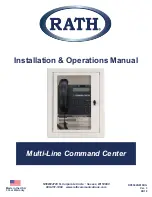
Copyright © 2000 Tunstall Group Ltd.
Lifeline 4000 Advanced User Guide (B)
41
Locations and location codes
Protocols.
When a Lifeline 4000 communicates with a control centre it uses a protocol. A protocol is
just an agreed method of communication. Lifeline 4000 can use a number of protocols, including the
TTNEW protocol, the Telelarm protocol, the Bosch protocol, the British Standards (BS) protocol and
the more advanced TT92 protocol.
Location codes.
Both the TT92 and BS protocols can be used to send location information. To
understand why this is important, imagine that you have been asked to set up a Lifeline 4000 in a
large five-bedroomed house shared by five people. You fit radio-based smoke detectors in every
bedroom, as well as the kitchen, the lounge and the hall. When one of these smoke detectors
raises an alarm all the control centre will be told is that a smoke detector has triggered an alarm
call. Yet, the fire brigade and police would ideally like to know which detector triggered the alarm
to allow them to plan an evacuation and find the fire quickly. Location information allows the
control centre to know which sensor has been triggered. It is not just of use in fires, but can also
help to identify a sensor that triggered an intruder alarm call, which can be particularly useful if
the sensor is faulty and has been raising false alarms.
The location codes used by the TT92 and BS protocols are standard (see adjacent tables).
However, you need to bear in mind that a control centre as sophisticated as PNC3 Vision can
override these standard codes, either globally for all calls or individually for particular properties
(see chapter 5 of volume A and chapter 2 of volume C in the PNC3 Vision User Manual).
Which location information should I enter?
If you enter the BS location information, but the
Lifeline 4000 is using the TT92 protocol, then you will find that the location information you have
entered will have no effect. If you are using the TT92 protocol then only the location information
entered for TT92 will be transmitted.
BS Codes and types.
The limitations of the BS protocol means that it also uses the location codes
to transmit information on the call type. Some of these are included in the smaller table below.
Examples
Program Radio Trigger Extension 1 to be a smoke detector in the main bedroom
1.
Enter local programming mode by holding down the
key and then holding down the # key until
the unit beeps. Release the # key first.
2.
Enter the parameter—press
6 1
.
3.
Delete the old value using the C key (display
version only).
4.
Enter 0 1 2 1 1 2 0 1 ,
and then press
.
5.
End local programming by pressing the
Cancel
key.
The 01 is the code for the smoke alarm type, the 21 is the
TT92 location code for the main bedroom, the 12 is the BS
location code for any bedroom, and the 01 is the BS priority.
A smoke alarm is usually the highest priority of 1. The TT92
codes do not need a priority as these are set automatically
for the type of alarm, although PNC3 Vision can override
these for any particular property.
e
p
y
T
l
l
a
C
S
B
e
d
o
C
S
B
t
r
e
l
A
y
t
i
v
i
t
c
a
n
I
0
3
t
r
e
l
A
e
r
u
t
a
r
e
p
m
e
T
h
g
i
H
1
4
t
r
e
l
A
e
r
u
t
a
r
e
p
m
e
T
w
o
L
2
4
t
r
e
l
A
s
a
G
3
4
e
r
u
l
i
a
F
t
i
u
c
r
i
C
g
n
i
t
h
g
i
L
4
4
m
r
a
l
A
e
k
o
m
S
/
e
r
i
F
6
4
e
r
u
l
i
a
F
g
n
i
t
a
e
H
7
4
m
r
a
l
A
r
e
d
u
r
t
n
I
0
5
l
l
a
C
c
i
d
o
i
r
e
P
1
6
e
r
u
l
i
a
F
r
e
w
o
P
s
n
i
a
M
3
6
l
l
a
C
e
c
i
v
r
e
S
8
6
Summary of Contents for Lifeline 4000
Page 4: ...4 Lifeline 4000 Advanced User Guide B Copyright 2000 Tunstall Group Ltd...
Page 24: ...24 Lifeline 4000 Advanced User Guide B Copyright 2000 Tunstall Group Ltd...
Page 72: ...72 Lifeline 4000 Advanced User Guide B Copyright 2000 Tunstall Group Ltd...
Page 74: ...74 Lifeline 4000 Advanced User Guide B Copyright 2000 Tunstall Group Ltd...
Page 79: ...Copyright 2000 Tunstall Group Ltd Lifeline 4000 Advanced User Guide B 79...
















































